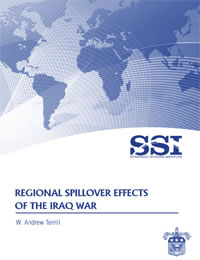Regional Spillover Effects of the Iraq War

Authored by Dr. W. Andrew Terrill.
January 2009
88 Pages
Brief Synopsis
The Iraq war has been one of the dominant factors influencing U.S. strategic thinking in the Middle East and globally since 2003. Yet the problems of this highly dynamic and fluid war have sometimes forced U.S. policymakers to address near-term issues that cannot be safely postponed at the expense of long-term strategic thought. Such a technique, while understandable, cannot continue indefinitely as an approach to policy. Long-term planning remains vital for advancing regionwide U.S. and Iraqi interests following a U.S. drawdown from Iraq. Such planning must include dealing with current and potential “spillover” from the Iraq war.
Regional spillover problems associated with the Iraq war need to be considered and addressed even in the event of strong future success in building the new Iraq. In less optimistic scenarios, these issues will become even more important. Spillover issues addressed herein include: (1) the flow of refugees and displaced persons from Iraq, (2) cross-border terrorism, (3) the potential intensification of separatism and sectarian discord among Iraq’s neighbors, and (4) transnational crime. All of these problems will be exceptionally important in the Middle East in the coming years and perhaps decades, and trends involving these issues will need to be closely monitored. The author presents ideas, concerns, and strategies that can help to fill this gap in the literature and enrich the debate on the actual and potential spillover effects of the Iraq war that will face U.S. policymakers, possibly for decades. Of these problems, he clearly is especially concerned with the spread of sectarian divisions which, if not properly managed, can have devastating regional consequences. This monograph forms an important baseline useful for considering future trends in each of the areas that the author has identified.
Summary
The author examines some of the most significant ongoing transnational or “spillover” problems associated with the continuing conflict in Iraq, with particular attention being paid to those problems that could disrupt or even undermine the stability of regional states beyond Iraq. Spillover issues addressed include: (1) refugees and displaced persons fleeing Iraq in large numbers for neighboring countries, (2) crossborder terrorism, (3) intensification of separatism and sectarian discord among Iraq’s neighbors fueled by conflict in Iraq, and (4) transnational crime. This work assumes that spillover influencing neighboring states will continue to occur even in best case scenarios where the Iraqi government rapidly assumes full sovereignty over the entire country in ways that allow it to provide security and stability to most of the population. In the perhaps more likely event that Iraq continues to wrestle with serious internal conflict, cross-border spillover problems could be significantly more intense. This monograph is designed to serve as an overview of the present dangers for Iraq’s neighbors and may intensify as a result of the ongoing conflict within Iraq. It assumes that no amount of U.S. effort and resources can compensate for Iraqis who are not willing or able to address the serious problems that still exist in organizing their society in ways that promote stability and minimize internal division. It is important that any future setbacks in the strategic situation in Iraq do not lead to intensified problems in the wider Middle East because U.S. strategists and policymakers focus so directly on short-term Iraqi issues that they fail to address how Iraqi problems influence the wider region. The time to begin dealing with the potential dangers of serious spillover problems is immediately, and not after the United States begins to withdraw from Iraq. The alternative approach, which is to assume that the United States will “fix” Iraq and therefore not have to deal with spillover issues, presupposes an almost perfect longterm outcome to the present situation, and is therefore a considerable gamble. At the present time, the danger of spillover problems involving Sunni-Shi’ite sectarian and Arab-Kurdish ethnic strife that moves beyond Iraq is probably more threatening to U.S. interests than any other spillover effect, including the Iraqi refugee crisis, terrorism, and Iraqi-based transnational crime. All of these issues are nevertheless important, and they must therefore be addressed by a comprehensive strategy.
Access Full Report [PDF]: Regional Spillover Effects of the Iraq War
|
NEWSLETTER
|
| Join the GlobalSecurity.org mailing list |
|
|
|

